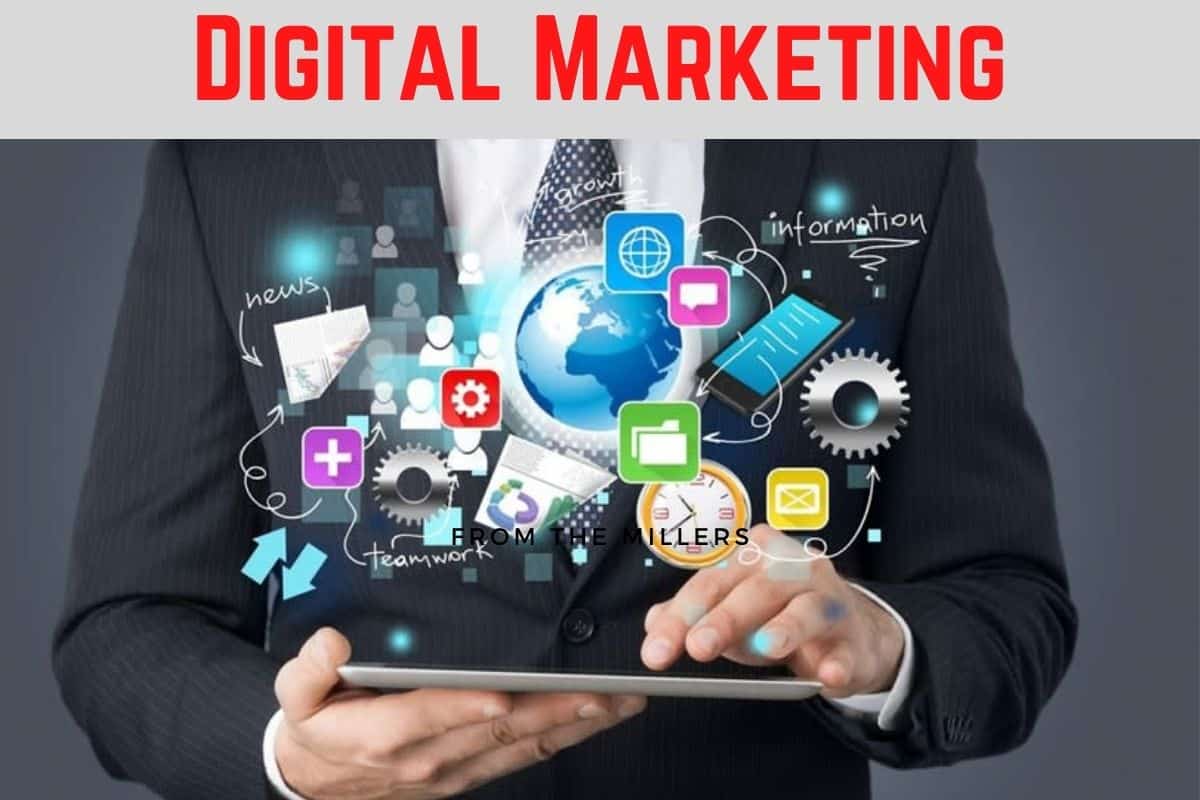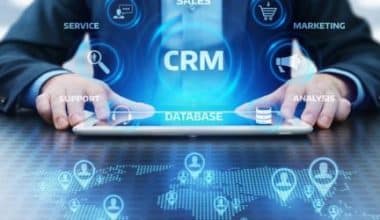In the world of marketing, evolution is inevitable. As a blogger/website owner or an entrepreneur, you would not want to miss out on the digitalized ways of making your products visible and accessible to your target audience. This is why I have come up with this piece of information to enlighten you on the assets, types, and strategies of digital marketing.
Before that, though, let me, first of all, bring you to an understanding of what digital marketing really is. Leggo!
What is Digital Marketing?
Digital marketing is the use of the internet, mobile devices, social media, search engines, and other channels to reach consumers. Otherwise known as “online marketing,” it is the process of promoting products or services via digital channels in order to reach a wider audience. The term “digital marketing” encompasses not just electronic mail, social media, and online ads but also text and multimedia messages.
The term “digital marketing” is used to describe any promotional effort that makes use of electronic means of communication. Some marketers view digital marketing as an entirely new endeavor that requires a new approach to customers and a new understanding of customer behavior compared to traditional marketing.
Why is Digital Marketing Important?
Because of the high level of competition in today’s business environment, it’s crucial to employ any and all marketing methods at your disposal. Digital marketing’s importance, however, has been enhanced by the increasing availability of digital platforms.
Many forms of digital marketing, from social media to text messaging, put you in direct contact with your target audience. Moreover, digital marketing has cheap overhead, therefore it’s a good choice for new and small firms.
Types of Digital Marketing
#1. Website marketing
A website is the core of all digital marketing activities. It is a very powerful channel on its own, but it is also the medium that is needed to execute a wide variety of online marketing campaigns. A website must present a brand, product, and service in a clear and memorable way. It should be fast, mobile-friendly, and easy to use.
#2. Pay-per-click (PPC) advertising
PPC advertising allows marketers to reach Internet users on a variety of digital platforms through paid ads. Marketers can set up PPC campaigns on Google, Bing, LinkedIn, Twitter, Pinterest, or Facebook and show their ads to people searching for terms related to products or services. PPC campaigns can segment users based on their demographics (eg, age or gender) or even target their specific interests or location. The most popular PPC platforms are Google Ads and Facebook Ads.
#3. Content marketing
The goal of content marketing is to reach potential customers through the use of content. The content is usually published on a website and then promoted through social media, email marketing, SEO, or even PPC campaigns. Content marketing tools include blogs, e-books, online courses, infographics, podcasts, and webinars.
#4. Email Marketing
Email marketing is still one of the most effective digital marketing channels. Many people mistake email marketing for spam, but that’s not what it is. Email marketing is the way to get in touch with your potential customers or those interested in your brand.
Many digital marketers use all other digital marketing channels to add leads to their email lists and then through email marketing create customer acquisition funnels to convert those leads into customers.
The main objectives of a social media marketing campaign are brand awareness and the generation of social trust. As you delve into social media marketing, you can use it to gain leads or even as a direct sales channel.
#6. Affiliate marketing
Affiliate marketing is one of the oldest forms of marketing and the Internet has given new life to this old resource. In affiliate marketing, influencers promote other people’s products and receive a commission every time a sale is made or a lead is introduced. Many well-known companies like Amazon have affiliate programs that pay millions of dollars each month to websites that sell their products.
#7. Video marketing
YouTube has become the second most popular search engine and many users turn to YouTube before making a purchase decision, studying, reading a review, or just relaxing. There are various video marketing platforms, including videos from Facebook, Instagram, or even TikTok to run a video marketing campaign. Businesses get the most success from video by incorporating it into SEO, content marketing, and broader social media marketing campaigns.
#8. SMS messages
Businesses and non-profit organizations also use SMS or text messages to send information about their latest promotions or provide opportunities to willing customers. Political candidates who are running for public office also use SMS campaigns to spread positive information through their own platforms. As technology advances, many text-to-give campaigns also allow customers to pay directly or give through a simple text message.
In Digital Marketing, What is SEO?
Search engine optimization, or SEO, is a way for businesses to get more traffic from search engines and move their websites and names to the top of the list of search results. This can be done with search results that come up naturally or with the help of editors. When SEO is used well as part of a company’s digital marketing strategy, more and more customers will see the company’s name and website.
Digital Marketing Assets
Almost anything can be a digital marketing asset. It just has to be a marketing tool that you use online. However, many people don’t know how many digital marketing assets are available to them. Here are some examples:
- Video content (video ads, product demos, etc)
- Your website
- Branded assets (logos, icons, acronyms, etc)
- Images (infographics, product shots, company photos, etc)
- Written content (blog posts, eBooks, product descriptions, testimonials, etc)
- Online products or tools (SaaS, calculators, interactive content, etc)
- Reviews
- Social media pages
What are the Challenges of Digital Marketing?
Digital marketing comes with its own unique challenges for those who do it. Digital channels are growing quickly, and digital marketers need to know how they work, how people use them, and how to use them to market their products or services effectively.
Furthermore, receivers are getting more and more ads, which makes it harder to get their attention. Digital marketers also find it hard to make sense of the huge amounts of data they collect and then use in new marketing campaigns.
The difficulty of collecting and using data well shows that digital marketing needs a strategy that is based on a deep understanding of how people act. For example, it might require a company to study new ways that customers act and learn more about the their journey.
What is a Digital Marketing Strategy?
A digital marketing strategy describes a series of actions that online marketing channels use to achieve different objectives. Channels can contain owned, paid, and earned media. With a digital marketing action plan, you can create and launch your online marketing strategy successfully.
The list of digital marketing strategies is also constantly evolving. However, these are some of the strategies that most companies use:
#1. Pay-per-click advertising
Pay-per-click (PPC) advertising is actually a broad strategy that covers any type of digital marketing where you pay for each user who clicks on an ad. For example, Google AdWords is a form of PPC advertising known as “paid search advertising” (which we’ll get to in a moment). Facebook Ads are another form of PPC advertising known as “paid social media advertising” (we’ll come back to this shortly).
#2. Paid search advertising
With Google, Bing, and Yahoo, you can run text ads on your search engine results pages (SERPs). Search-based advertising is one of the best ways to target potential customers who are actively looking for a product or service like yours.
#3. Search engine optimization (SEO)
If you don’t want to pay to appear in the SERPs, you can also use search engine optimization (SEO) to try to organically rate the pages or blog posts on your website. You don’t have to pay directly for each click, but ranking a page generally takes a lot of time and effort (see this article for a more detailed comparison of paid search and SEO).
#4. Paid advertising
Most social media platforms such as Facebook, Instagram, Twitter, LinkedIn, Pinterest, and Snapchat allow you to place ads on your website. Paid advertising on social media is great for raising awareness of an audience that may not know your business, product, or service exists.
Like SEO, social media marketing is the organic and free way to use social media platforms like Facebook or Twitter to market your business. And just like search engine optimization, marketing your business organically on social media takes a lot more time and effort, but can yield much better results in the long run.
#6. Conversion rate optimization (CRO)
Conversion Rate Optimization (CRO) is the art and science of improving your online user experience. In most cases, businesses use CROs to get more conversions (leads, chats, calls, sales, etc.) from their existing website traffic.
#7. Content marketing
Content marketing is another pretty broad term for digital marketing. It encompasses any digital marketing effort that uses content assets (blog posts, infographics, e-books, videos, etc.) to increase brand awareness or increase clicks, leads, or sales.
#8. Native advertising
Most native promotions are included in content marketing because they use the content to attract clicks. Native advertising is often a bit difficult to spot as it is usually mixed in with recommendations for unpaid content. But that’s exactly what it’s about.
#9. Email Marketing
Email marketing is the oldest form of online marketing and it is still going strong. Most digital marketers use email marketing to promote special offers, highlight content (often as part of content marketing), or promote an event.
#10. Affiliate marketing
Affiliate marketing essentially pays another person (person or business) to promote your products and services on their website.
Many businesses either hire an agency to manage their digital marketing efforts or pay for an in-house marketing team and marketing automation software to meet their marketing needs.
Check out free courses on Affiliate Marketing for Beginners.
How do you Create Digital Marketing Strategy?
Using the principles below as a starting point, you may develop a successful digital marketing strategy to boost brand visibility, engagement, and sales.
- Set SMART goals
- Identify your audience
- Create a budget
- Select your channels
- Improve on your marketing efforts
Digital Marketing Salary
To find out how much to spend on digital marketing, the first thing you need to do is clarify your goals. The approach to digital marketing can vary greatly depending on whether your end goal is to get clicks, conversions or leads, sales, sales, or a specific return on investment (ROI).
If you know for sure, the end goal of any marketing effort should be ROI. If your digital marketing spend is not generating profitable income for your business, why are you marketing online?
Clicks and even conversions are great, but your business doesn’t make money from clicks (in fact, you actually spend money on clicks) or conversions. Make money from sales.
With that in mind, the first thing to do is determine how many sales you want to make before committing to a digital marketing budget. Once you know this, you can use this information to determine how much advertising spend will be required to reach that revenue goal.
How Can I Become a Digital Marketer?
Digital marketers need to be good at writing, analyze data, and know how to use social media. For most digital marketing jobs, you need a bachelor’s degree in a business field like marketing or a related field like communications. You might also want to take digital marketing classes or bootcamps. Having an internship while you are in school can also be helpful.
A master’s degree in digital marketing could be helpful, but it is not required to work in the field.
Is Inbound Marketing the Same as Digital Marketing?
How is inbound marketing any different from digital marketing?
For good reason, digital marketing and inbound marketing are frequently equated. Many of the same methods are used in digital marketing as inbound marketing, such as email and web content, to mention a few. Both exist to attract prospects’ attention and convert them into customers during the buyer’s journey. However, the two approaches have opposing viewpoints on the link between the instrument and the aim.
Digital marketing takes into account how specific technologies or digital platforms might convert prospects. A brand’s digital marketing strategy may include numerous channels or focus entirely on one. For example, a corporation may develop content solely for social media platforms and email marketing campaigns while disregarding other kinds of digital marketing.
Inbound marketing, on the other hand, is a comprehensive notion. It assesses the aim first, then examines the available tools to identify which would effectively reach target clients, and then where in the sales funnel that should occur. Assume you want to increase website traffic in order to produce more prospects and leads. When designing your content marketing plan, you can prioritize search engine optimization, resulting in more optimized material such as blogs, landing pages, and more.
The most essential thing to understand about digital marketing and inbound marketing is that you don’t have to pick between the two as a marketing expert. They actually operate best together. Inbound marketing gives structure and purpose for efficient digital marketing activities, ensuring that each digital marketing channel works toward a common goal.
Digital Marketing and Data Security
Are you aware that your digital marketing strategies can be an avenue for hackers to ruin your business and even deceive your customers? Data marketing opens plenty of doors for businesses to promote their offerings to a wider audience. However, it’s also a gateway for cybercriminals to target and attack vulnerable businesses by employing viruses and malware. Some examples of malware include bots and zombies, spyware, ransomware, worms, and viruses.
A trojan horse is also another type of malware that’s usually delivered through free downloads or email attachments. Malware is sent to the user’s device when they open or download the free download or email. So, when you send or receive emails as part of your marketing tactic, you need to make sure they’re free from malicious codes or malware.
In addition, cybercriminals can use advertisements on websites to take over a user’s computer, steal identity, and even access online bank accounts. Malicious ads or “malvertisements” can also embed malware or viruses that can infect computers.
Because digital technology is getting better, cybercriminals have better ways to trick consumers and business owners. Hence, security awareness training is necessary to avoid being victimized by hackers. Keep yourself abreast with the right information to safeguard your business data when implementing digital marketing campaigns.
What is a Digital Marketing Agency?
A digital marketing agency is a company that only does marketing to consumers through digital channels. This includes making and launching campaigns for corporate clients using, among many other things, social media, pay-per-click advertising, videos, and websites.
How Does Digital Marketing Work?
- Search Engine Optimization. Every time you need to know or purchase something, the first thing you do is search it up on the Google search engine. …
- Pay-per-click Advertising. …
- Website Marketing. …
- Content Marketing. …
- Social Media Marketing. …
- Email Marketing. …
- Affiliate Marketing.
How Do I Become a Digital Marketer?
- Attend Networking Events. …
- Learn from Digital Marketing Brands and Entrepreneurs. …
- Connect with Like-Minded Individuals and Peers. …
- Find a Digital Marketing Internship. …
- Become a Member of a Professional Body. …
- Stay Up to Date on the State of Digital Marketing. …
- Never Stop Learning.
What Is an Example of Digital Marketing?
Digital marketing is the marketing and advertising of a business, person, product, or service using online channels, electronic devices, and digital technologies. A few examples of digital marketing include social media, email, pay-per-click (PPC), search engine optimization (SEO), and more.
Conclusion
Digital marketing is the marketing of the future. In addition to all the benefits we’ve discussed in this article, you can track the results of your digital marketing efforts with incredible precision. So it’s easy to see which strategies produce profitable results and which ones require some work.
- PPC Advertising: Guide To PPC and Advertising Agencies
- PAY PER CLICK ADVERTISING (PPC): Costs And Top 7 Agencies
- Digital Marketing Services: 21+ Digital Marketing Agencies
- Top 10 Digital Marketing Companies in Nigeria (Updated!)
- DIGITAL MARKETING STRATEGIES: Best Easy framework, & Options with examples (Detailed guide)







1 comment
Great read regarding an overview of digital marketing as well as the benefits for continued business success. Thanks for this.